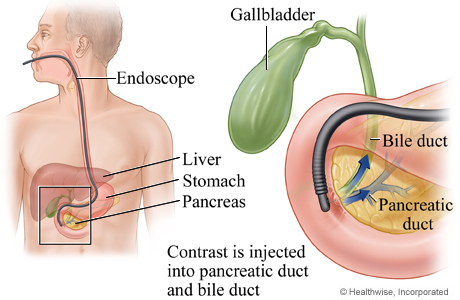
What is an ERCP?
What is an ERCP?
ERCP (short for endoscopic retrograde cholangiopancreatography) is a procedure used to diagnose diseases of the gallbladder, bile system, pancreas, and liver. In addition, ERCP can often be used to treat problems in these parts of the digestive system.
What happens during the procedure?
During the procedure, an endoscopist, usually a gastroenterologist (doctor who specializes in the gastrointestinal system), uses a special endoscope (a long, flexible tube with a light and camera at the end) to examine the inside of the digestive system.
The endoscopist identifies the place where the bile duct comes into the intestine and then feeds a tiny catheter (a plastic tube) into the duct and squirts in a contrast agent while X-rays are taken.
The contrast agent allows the doctors to see the ducts of the bile system, gallbladder, and pancreas on the X-rays.
Once the source of the problem is identified, the doctor may then treat it by performing one of the following procedures:
Sphincterotomy. This involves making a small incision in the opening of the bile duct, which can help small gallstones and bile to drain appropriately.
Stent placement. A stent is a plastic drainage tube that is placed in the bile duct and allows it to drain
Gallstone removal
Is the procedure safe?
An ERCP is considered a low-risk procedure. Complications requiring hospitalization may occur; however, they are uncommon. These can include pancreatitis, infections, bowel perforation, and bleeding. Patients may experience tenderness or a lump where the sedative was injected, but that should go away in a few days.
Patients undergoing ERCP for treatment, such as for gallstone removal, face a higher risk of complications than patients undergoing diagnostic ERCP. Your doctor will discuss your risks of possible complications before the test.
How should I prepare for the procedure?
Be sure to tell your doctor if you are pregnant, have a lung or heart condition, or if you are allergic to any medications. Also, tell the doctor if you have an artificial heart valve or if you have ever been told you need to take antibiotics before a dental or surgical procedure. You may need to take antibiotics before the ERCP.
If you have diabetes and use insulin, you may need to adjust the dosage of insulin on the day of the test. Your diabetes care provider will help you with this adjustment
Bring your diabetes medication with you so you can take it after the procedure.
Do not discontinue any medication without first consulting with your primary care or referring doctor.
Do not eat or drink anything for eight hours before the procedure.
You will need to bring a responsible adult to accompany you after the procedure. You should not drive or operate machinery for at least eight hours because the medication given during the procedure may cause drowsiness.
You may need to stay overnight in the hospital after the procedure, so pack personal items you may need.
What happens during the procedure?
Before the procedure, you will be given a hospital gown to wear and you will be asked to remove your eyeglasses and dentures. The doctor performing the procedure will discuss what will happen during the procedure and will explain any risks. If you have any questions, now is the time to discuss them with the doctor.
An endoscopist experienced in ERCP performs the procedure, which lasts from one to two hours. A local anesthetic (pain-relieving medication) may be applied to the back of your throat. You are given a pain reliever and a sedative intravenously (in your vein). You will feel relaxed and drowsy.
A mouthpiece is placed in your mouth. It does not interfere with your breathing.
Contrast material is injected slowly into the pancreatic or biliary ducts while X-rays are taken. The contrast agent enables the ducts to appear on the X-rays.
What happens after the procedure?
You will stay in a recovery room for about 1-2 hours for observation. You may feel a temporary soreness in your throat. Lozenges may help
A responsible adult must accompany you after the procedure. It is also recommended that a responsible adult stay with you for 24 hours after the procedur
Do not drive or operate machinery for at least eight hours
Stay overnight within a 30-minute drive of the hospital so that you can get to the emergency room quickly to be evaluated, if necessary.
The results will be sent to your primary care or referring doctor, who will discuss them with you. If the results of the procedure indicate that prompt medical attention is needed, the necessary arrangements will be made and your referring doctor will be notified.
If you have severe abdominal pain, a continuous cough, fever, chills, chest pain, nausea, or vomiting within 72 hours after the procedure, call your doctor or go to the nearest emergency room.